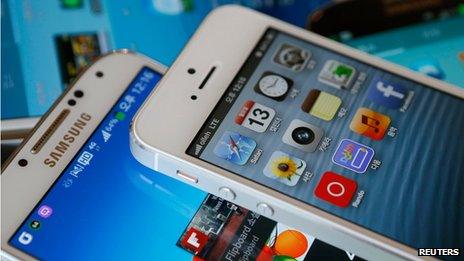Apple and Samsung back in court over patent damages
- Published

Apple and Samsung return to court to establish how much the South Korean firm must pay in damages for infringing patents
Apple and Samsung are returning to court in one of the most high-profile patent battles of recent times.
In August 2012, a jury found Samsung guilty of infringing six Apple patents and awarded one of the largest payouts of its kind on record.
The verdict and $1bn (拢626m) awarded in damages were seen as a massive victory for Apple.
This is just one of many patent cases the two companies are fighting in courtrooms across the world.
In March 2013, a judge re-examined the $1bn awarded to Apple and reduced the amount saying the damages would need to be assessed at a new trial.
Judge Lucy Koh said the original jury in the court in California had incorrectly calculated part of the damages.
The judge said that $550m of the award had been worked out in the proper manner but she ordered that the remaining $450m be reassessed.
That $450m could be increased or lowered meaning that Apple could conceivably end up with more than the original $1bn awarded at the first trial.
Apple had originally sought $2.5bn in damages from Samsung.
Apple claimed that Samsung copied elements of its user interface on its iPad and iPhone devices
It argued that the South Korean company had copied its designs for the bodies of the original iPhone and iPad as well as user-interface elements such as the bounce-back response when a person scrolls beyond the end of list and tap-to-zoom.
Samsung argued it was already working on rounded rectangular handsets dominated by a screen and a single button months before the iPhone was revealed. It sought $519m in damages from Apple.
Stealing isn't right
At the time of the original ruling Samsung said the decision was bad news for consumers and would "lead to fewer choices, less innovation, and potentially higher prices".
Apple said it applauded the court "for finding Samsung's behaviour wilful and for sending a loud clear message that stealing isn't right".
Even after this latest trial, which will involve a new jury, both companies could appeal.
"I think they will appeal unless they settle," intellectual property consultant Florian Mueller told the 91热爆.
"But at this point neither party has enough leverage to force someone into settling if they don't want to. And we're not there yet," he said.
Apple has asked for a sales ban to be imposed on the Samsung products that had been found to infringe the patents. But the judge ruled that Apple could adequately be compensated financially.
"Between these types of big players a $1bn damages award is not as bad as a sales ban," said Mr Mueller.
Battles between Apple and Samsung have escalated as Samsung has eaten into Apple's market share
Apple appealed against that ruling and the result of the appeal is due before the end of the year.
Samsung and Apple are currently locked in a battle in the courts of more than 10 countries across Europe.
Sharing good technology
But some senior technology experts believes the legal conflict is bad for consumers.
Apple co-founder Steve Wozniak told the 91热爆 recently that: "There are good things I see on Samsung phones that I wish were in my iPhone; I wish Apple would use them, and could use them, and I don't know if Samsung would stop us.
Samsung has now overtaken Apple as the best-selling smartphone-maker
"I wish everybody just did a lot of cross-licensing and sharing the good technology; all our products would be better, we'd go further.
"I do kind of wish they were more compatible."
In October, Samsung offered to stop taking rivals to court in Europe over alleged infringements of certain types of patents for a period of five years.
The European Union authorities have taken the "preliminary view" that the South Korean company's litigious actions were stifling competition. Samsung faces a potential 拢11.3bn ($18.3bn) fine if found guilty of breaching European anti-trust laws.
- Published1 March 2013
- Published1 November 2013